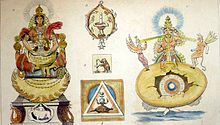Prajapati
| Prajapati | |
|---|---|
| 2nd Kamadeva | |

An attempt to depict the creative activities of Prajapati, a steel engraving from the 1850s
|
|
| Preceded by | Bahubali |
| Succeeded by | Sridhara |
In Hinduism, Prajapati (Sanskrit: प्रजापति (IAST: prajā-pati)) "lord of people" is a group of Hindu deities presiding over procreation and protection of life, and thereby a King of Kings (Rajanya or Rajan).
Prajapati is a Vedic deity presiding over procreation, and the protection of life. He was mentioned as Daksha in Hiranyagharbhasuktham as the creator deity emerging from supreme god vishvakarman above the other Vedic deities in RV 10 and in Brahmana literature. According to later beliefs in the post-Vedic Era, the Prajapatis were elected democratically. At first Lord Bràhma was elected as Prajapati (in the west of Aryavarta or Bharata), Lord Vishnu was then elected democratically/unanimously as Prajapati (in the East of Aryavarta or Bharata) by all the Rishis and subjects of that era and sat on the throne of Prajapati. Thereafter, Lord Shankar (in the South of Aryavarta or Bharata) or Rudras were elected as Prajapatis. The throne of Prajapati succeeded further and there were about 26 Prajapatis, as mentioned in later puranas
In later times, he is identified with the personifications of Time, Fire, the Sun, etc. He is also identified with various mythical progenitors, especially (Manu Smrti 1.34) the ten lords of created beings first created by Brahmā, the Prajapatis Marichi, Atri, Angiras, Pulastya, Pulaha, Kratu, Vasishtha, Prachetas or Daksha, Bhrigu, Nārada.
The Mahabharata mentions, in the words of celestial sage Narada, 14 Prajapatis (lit:caretakers of the Praja) Hiranyagarbha is the source of the creation of the Universe or the manifested cosmos in Indian philosophy, it finds mention in one hymn of the Rigveda (RV 10.121), known as the 'Hiranyagarbha sukta' and presents an important glimpse of the emerging monism, or even monotheism, in the later Vedic period, along with the Nasadiya sukta suggesting a single creator deity predating all other gods (verse 8: yó devéṣv ádhi devá éka âsīt, Griffith: "He is the God of gods, and none beside him."), in the hymn identified as Prajapati.
The Upanishads calls it the Soul of the Universe or Brahman, and elaborates that Hiranyagarbha floated around in emptiness and the darkness of the non-existence for about a year, and then broke into two halves which formed the Swarga and the Prithvi. In classical Puranic Hinduism, Hiranyagarbha is a name of Brahma, so called because he was born from a golden egg (Manusmrti 1.9), while the Mahabharata calls it the Manifest.
...
Wikipedia
